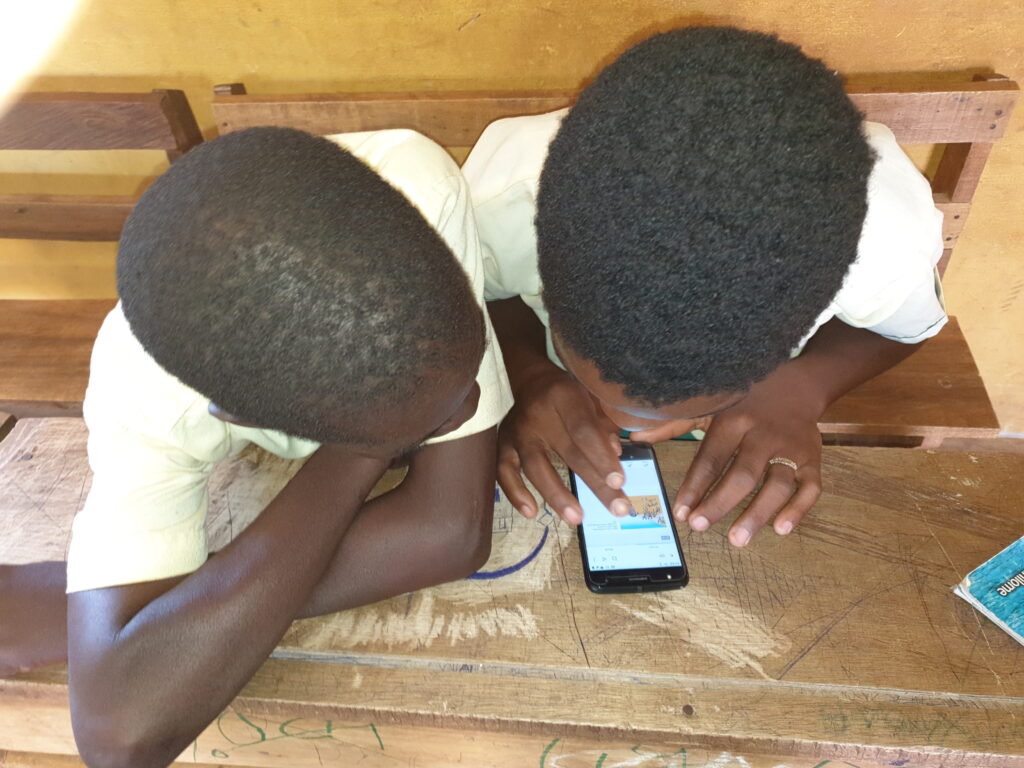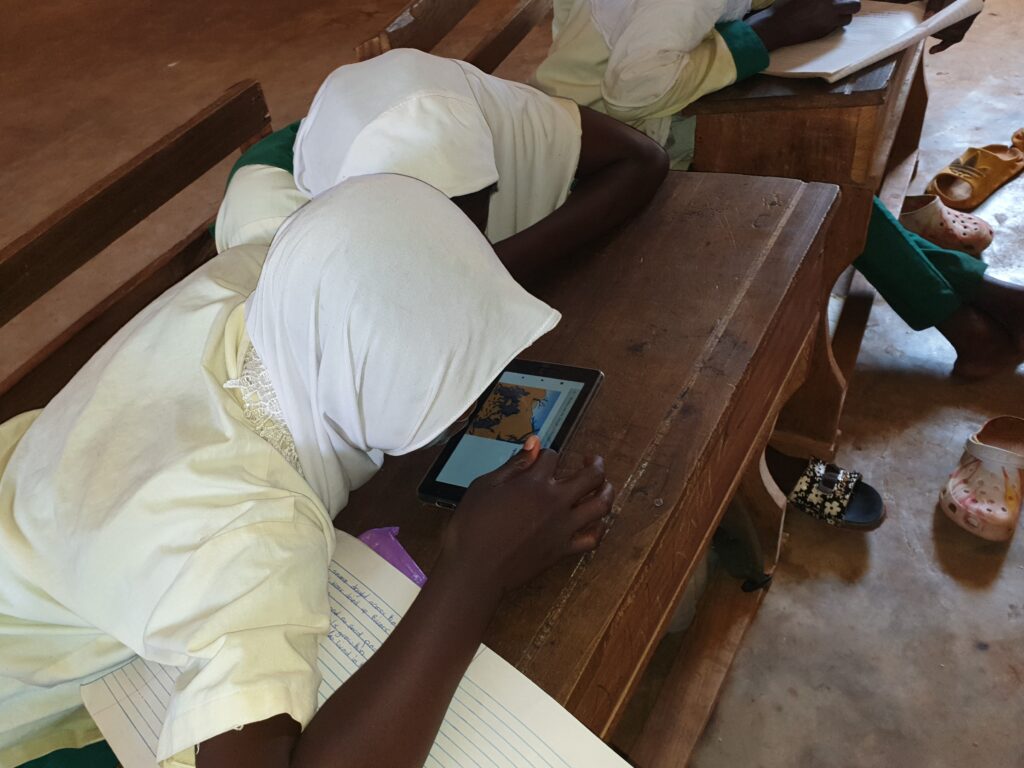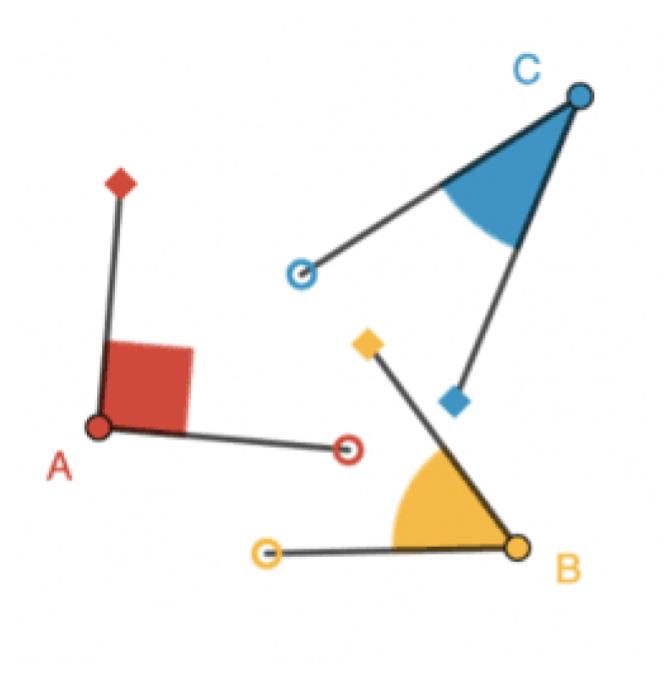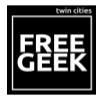Literacy in the Mother Tongue in Africa
This project is funded by a grant from the Creative Commons Open Education Platform with additional support from STEAM NPC of Durban, South Africa; SABIER of Minneapolis USA; and Siemens-Stiftung of Munich, Germany.
These students in Tamale, Northern Region, Ghana are studying their mother tongue, Dagbani, on WIFI devices connected to a MoodleBox. There is no internet available in their school or community except via data plans on cell phones which their teacher uses to download the OER Dagbani material from African Storybook. He is then able to create comprehension assessments on MoodleBox.
The project consists of three major components. They are:
1. Creating, curating, sourcing OER content that meets the needs of elementary students aligned to both Ghanaian and South African standards. A special emphasis is on incorporating materials edited and adapted for and translated into the local languages in addition to the use of English language materials. The courses will be openly licensed and shared via MoodleNet.
2. Implementing the OER content in the classrooms on open source MoodleBox software on portable servers that do not require internet access.
3. Creating professional development courses for teachers to support their implementation of the OER curriculum. These Prof Dev courses will be conducted on an open source Moodle system; the courses will be openly licensed and shared via MoodleNet.
Our goal was that by October 31, 2023, teachers at two schools in rural Ghana and one in a township in the Western Cape, SA, would be participating in ongoing professional development. We already met that goal and are setting new goals to include more schools.
Nomvuyo Mgoqi, who was an Education Specialist at the University of Cape Town, is leading teacher for professional development in the Western Cape with support from Kathryn Kure of the STEAM Foundation NPC. Peter Amoabil leads teachers for both schools in Ghana with support from Dan McGuire of SABIER.
This project supports the attainment of the UN Sustainable Development Goals and UNESCO’s Education for Sustainable Development (ESDs); it fosters inclusive participation; and it’s an innovative application of Open Educational Resources and curriculum design.
Ghana and South Africa face similar problems in providing education at all levels but especially at the elementary level. A particular problem in both countries is the availability of appropriate reading material. Both countries have national requirements that instruction is to be provided in the mother tongue of the children for at least the first three years and then gradually transition to the dominant language, usually English. Ghana and South Africa have eleven official local languages each for a total of twenty different languages.
The Catch 22 is that neither country is able to provide materials in the local languages. Teachers are left to make it up on their own with chalk and chalkboards. Our project provides a solution. Editable digital books are provided via a portable server that does not require internet access. Students access the server via inexpensive WIFI only devices. Teachers are trained in the process of translating and creating appropriate assessments in both English and the local languages – Dagbani in Ghana and isiXhosa in South Africa. This project is replicable nationally in both countries and for all of the various local languages. Over 9 million students are potential beneficiaries in just these two countries.
Digital Literacy in Ghana

We’ve begun a professional development program for teachers of Rural Literacy Solutions (RLS) in Tamale, Ghana. In partnership with RLS Director, Peter Amoabil, we’ve acquired a small portable digital server that houses all of the learning materials needed for Reading, Math and Science instruction for one classroom. The small server enables as many as thirty students at a time to connect with WIFI devices which were also acquired by RLS with SABIER’s support. We’ve begun a professional development program to support the RLS teachers in being able to use free digital educational resources for instruction. Peter hopes that with SABIER’s help the program can be expanded to other schools in Ghana where internet and digital devices have never previously existed.
We first met Peter in August of 2022, he’s now using digital materials successfully in one classroom. Peter’s students are super excited. Neither they, their families, or the school have ever had WIFI devices before. They don’t have any internet service and cell service is too expensive for any of the families. Peter has obtained free digital books from African StoryBook in both English and Dagbani, the traditional language of the families around Tamale. The students really like reading their own language on digital devices. It’s a first in the Northern Region of Ghana.
Our goal is to support more students and teachers with more servers, digital materials, and WIFI devices. And, we’ll assist the teachers in using them effectively. All of the learner content is directed by the teacher. Students are able to communicate with each other and their teacher both synchronously and asynchronously. Because the small portable server, which fits in a shirt pocket, is not connected to the internet, student data and privacy is very secure, and there are zero distractions from other websites.

Open
Educational
Resources
Professional Development
-students can better see themselves in the content they’re studying;
-students can use multiple types of media to create solutions to problems.
Please contact us at support@sabier.org if you would like to participate in this work.
Content Projects
All of SABIER’s content projects are free, openly licensed courses that are designed for both distance learning and Face 2 Face learning. The content can be a replacement curriculum or be used as a digital addition or option for existing curriculum.
Any or all of the unit course files can be uploaded into your school’s LMS. Teachers can also select just those lessons or activities they choose to use.
The GeoGebra Illustrative Mathematics courses can be downloaded here.
If you would like to try out one of the other courses in an LMS, request access at support@sabier.org
Elementary Science
3rd Grade Science
3rd Grade Science is an LMS course with interactive activities for students created using content from the Minnesota Partnership for Collaborative Curriculum. Contact support@sabier.org if you would like to try out the course.
Middle School Mathematics
Geogebra + Illustrative Mathematics + Your LMS = Great Teaching and Learning
These free, openly licensed LMS courses extend the capabilities of Geogebra’s interactive applets designed for video conferencing software. Read more

High School Chemistry
Libretexts Chemistry in Moodle
This is an OER course that uses a chemistry text from Libretexts and is housed in a Moodle course with homework quizzes created by Andrew Lyman-Butler. Read More
.
OER for Concurrent Enrollment
SABIER provides professional development and stipends for teachers in rural school districts who have students enrolled in concurrent enrollment program. Read More
SABIER’s work enables philanthropy and foundation funding to go directly to supporting teachers and students to be able to use free openly licensed content that can be adapted to meet the needs of students. In addition to the further empowerment of teachers and students, the potential savings to school systems globally is as much as $30 Billion annually. We will do our part..
Your donation is tax deductible. The Stone Arch Bridge Initiative for Education Resources is an exempt organization as described in Section 501(c)3 of the Internal Revenue Code For more information contact: support@sabier.org Image courtesy of Stuart Miles@FreeDigitalPhotos.net
We’re grateful for the support of FreeGeek TwinCities.
